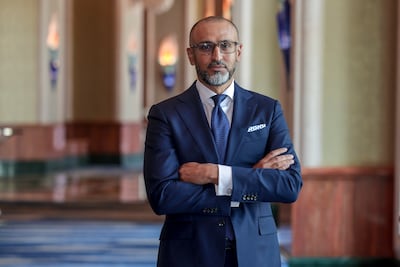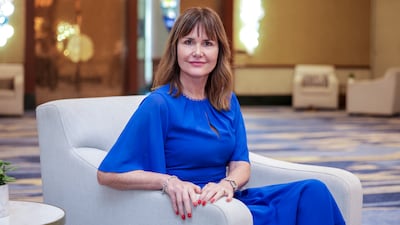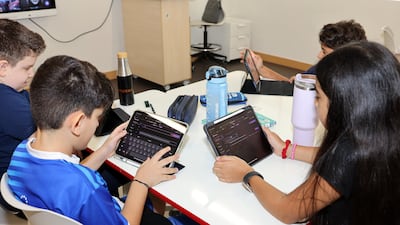Artificial intelligence use in schools is “an inevitability”, but finding the right balance between embracing the technology and maintaining traditional teaching techniques is the key to success, the head of the Middle East’s largest private education group has said.
Dino Varkey, group chief executive at Gems Education, said it spent “a lot of time” as educators try to determine how AI can be used more effectively in schools.
Tools including ChatGPT are used worldwide, causing debate over how best to bring them into the classroom. Mr Varkey is well aware that schools have to change to get the best out of the technology, with assessment a particular area of focus.
“Typically what you're trying to do, as AI is encroaching much more into our daily lives … the nature of the assessments that we perhaps need to do with our students needs to change and be transformed a little bit,” he said.
He was speaking at the Gems Awareness Day on Wednesday, where more than 1,700 newly recruited teachers for this academic year were being welcomed.
How will AI change testing?
When asked whether pupils would face disciplinary action for using generative AI tools like ChatGPT to write essays, Mr Varkey said traditional take-home essay assignments are “the wrong type of assessment” in the modern world.
He suggested pupils could instead be tasked with using AI tools for research at home and then produce written work independently in class.
“In an exam situation, it's different. But if you're going to ask a child today to go and write an essay on something at home and bring it back, then that's actually not the right assessment,” he said. “We have tools to allow us to be able to identify things that are clearly sort of written and or produced with the use of AI. But again, I would argue that the assessments need to change.”
How will AI be used in schools?
Mr Varkey was speaking behalf of Gems, a private educator, and while all private school groups across the UAE are looking at AI use, each has a slightly different approach.
However, in government schools new AI classes are to be introduced across all stages of government education in the UAE from reception to grade 12 starting from the coming 2025/26 academic year.
“The subject will matter on teaching students how to use artificial intelligence in an ethical and responsible way,” Sarah Al Amiri, Minister of Education, said at an event on Tuesday.
“In the first and second cycle, there will be one class every two weeks focused on raising awareness towards the benefits and potential harms of AI, while on the third cycle it will be focused on using AI effectively.”
The subject will be taught by the same teachers that teach computer science; they were trained specifically to teach AI for this year. Additionally, there will be a specialised committee that makes sure the subject is being taught effectively.
Focus on human values
Mr Varkey agrees for private sector schools, stressing that it is important to be aware of not just the benefits of AI but also the potential harms. He stressed that essential skills such as memory-building and critical thinking are important.
“The chair of our council, Baroness Spielman, would tell you that actually the use of AI in perhaps a more typical manner will lead to cognitive debt,” he said. “That effectively means that a student’s ability to retain something in the long-term memory can be completely impacted. There is a lot to do in terms of being able to use AI in the most effective manner.”
Lisa Crausby, group chief education officer at Gems, added: “It has a value. What we're saying, though, is that you still need all the other knowledge components and skills.
“As everybody's trying to lean into AI, we're actually shining a really big spotlight on our values, because you don't want to lose that. It’s one thing AI can't offer.”
The UN culture agency (Unesco) said that there was a lack of guidance worldwide on how AI should used in classrooms to improve learning outcomes.
It said that its research in 2022 showed that only 15 countries had included AI learning objectives in their national curriculum, but only half of them had developed AI frameworks or programmes for teachers.
New teachers recruited
The academic year starts on August 25 in the UAE, with Gems welcoming more than 1,700 newly recruited teachers across the country and Qatar.
That is a drop from last year’s 1,850 new recruits, but Ms Crausby said it was a “good sign” because the retention rate is improving.
Taaleem, which operates more than 30 schools in the UAE, said they had a 25 per cent increase from last year in the number of new educators.
“Taaleem has seen a significant increase in teacher recruitment this academic year, reflecting both the population boom across the country and the continued growth of our schools,” the group told The National. “In August alone, we successfully onboarded more than 500 new teachers, alongside senior leaders, learning assistants and administrative staff.”
Taaleem said it was seeing a “strong interest” from teachers abroad who are interested to work in the UAE.
It said their new hiring model means they start recruitment planning a year in advance and recommended teachers to demonstrate “adaptability, cultural awareness and commitment to professional development”.
More from Neighbourhood Watch:
'The worst thing you can eat'
Trans fat is typically found in fried and baked goods, but you may be consuming more than you think.
Powdered coffee creamer, microwave popcorn and virtually anything processed with a crust is likely to contain it, as this guide from Mayo Clinic outlines:
Baked goods - Most cakes, cookies, pie crusts and crackers contain shortening, which is usually made from partially hydrogenated vegetable oil. Ready-made frosting is another source of trans fat.
Snacks - Potato, corn and tortilla chips often contain trans fat. And while popcorn can be a healthy snack, many types of packaged or microwave popcorn use trans fat to help cook or flavour the popcorn.
Fried food - Foods that require deep frying — french fries, doughnuts and fried chicken — can contain trans fat from the oil used in the cooking process.
Refrigerator dough - Products such as canned biscuits and cinnamon rolls often contain trans fat, as do frozen pizza crusts.
Creamer and margarine - Nondairy coffee creamer and stick margarines also may contain partially hydrogenated vegetable oils.
Farage on Muslim Brotherhood
Nigel Farage told Reform's annual conference that the party will proscribe the Muslim Brotherhood if he becomes Prime Minister.
"We will stop dangerous organisations with links to terrorism operating in our country," he said. "Quite why we've been so gutless about this – both Labour and Conservative – I don't know.
“All across the Middle East, countries have banned and proscribed the Muslim Brotherhood as a dangerous organisation. We will do the very same.”
It is 10 years since a ground-breaking report into the Muslim Brotherhood by Sir John Jenkins.
Among the former diplomat's findings was an assessment that “the use of extreme violence in the pursuit of the perfect Islamic society” has “never been institutionally disowned” by the movement.
The prime minister at the time, David Cameron, who commissioned the report, said membership or association with the Muslim Brotherhood was a "possible indicator of extremism" but it would not be banned.
How to donate
Send “thenational” to the following numbers or call the hotline on: 0502955999
2289 – Dh10
2252 – Dh 50
6025 – Dh20
6027 – Dh 100
6026 – Dh 200
The%20specs
%3Cp%3E%3Cstrong%3EEngine%3A%3C%2Fstrong%3E%201.8-litre%204-cyl%20turbo%0D%3Cbr%3E%3Cstrong%3EPower%3A%20%3C%2Fstrong%3E190hp%20at%205%2C200rpm%0D%3Cbr%3E%3Cstrong%3ETorque%3A%3C%2Fstrong%3E%20320Nm%20from%201%2C800-5%2C000rpm%0D%3Cbr%3E%3Cstrong%3ETransmission%3A%20%3C%2Fstrong%3ESeven-speed%20dual-clutch%20auto%0D%3Cbr%3E%3Cstrong%3EFuel%20consumption%3A%3C%2Fstrong%3E%206.7L%2F100km%0D%3Cbr%3E%3Cstrong%3EPrice%3A%3C%2Fstrong%3E%20From%20Dh111%2C195%0D%3Cbr%3E%3Cstrong%3EOn%20sale%3A%20%3C%2Fstrong%3ENow%3C%2Fp%3E%0A
UAE currency: the story behind the money in your pockets
What is the FNC?
The Federal National Council is one of five federal authorities established by the UAE constitution. It held its first session on December 2, 1972, a year to the day after Federation.
It has 40 members, eight of whom are women. The members represent the UAE population through each of the emirates. Abu Dhabi and Dubai have eight members each, Sharjah and Ras al Khaimah six, and Ajman, Fujairah and Umm Al Quwain have four.
They bring Emirati issues to the council for debate and put those concerns to ministers summoned for questioning.
The FNC’s main functions include passing, amending or rejecting federal draft laws, discussing international treaties and agreements, and offering recommendations on general subjects raised during sessions.
Federal draft laws must first pass through the FNC for recommendations when members can amend the laws to suit the needs of citizens. The draft laws are then forwarded to the Cabinet for consideration and approval.
Since 2006, half of the members have been elected by UAE citizens to serve four-year terms and the other half are appointed by the Ruler’s Courts of the seven emirates.
In the 2015 elections, 78 of the 252 candidates were women. Women also represented 48 per cent of all voters and 67 per cent of the voters were under the age of 40.
COMPANY%20PROFILE
%3Cp%3E%3Cstrong%3ECompany%3A%3C%2Fstrong%3E%20Eco%20Way%3Cbr%3E%3Cstrong%3EStarted%3A%3C%2Fstrong%3E%20December%202023%3Cbr%3E%3Cstrong%3EFounder%3A%3C%2Fstrong%3E%20Ivan%20Kroshnyi%3Cbr%3E%3Cstrong%3EBased%3A%3C%2Fstrong%3E%20Dubai%2C%20UAE%3Cbr%3E%3Cstrong%3EIndustry%3A%3C%2Fstrong%3E%20Electric%20vehicles%3Cbr%3E%3Cstrong%3EInvestors%3A%3C%2Fstrong%3E%20Bootstrapped%20with%20undisclosed%20funding.%20Looking%20to%20raise%20funds%20from%20outside%3Cbr%3E%3C%2Fp%3E%0A
Draw
Quarter-finals
Real Madrid (ESP) or Manchester City (ENG) v Juventus (ITA) or Lyon (FRA)
RB Leipzig (GER) v Atletico Madrid (ESP)
Barcelona (ESP) or Napoli (ITA) v Bayern Munich (GER) or Chelsea (ENG)
Atalanta (ITA) v Paris Saint-Germain (FRA)
Ties to be played August 12-15 in Lisbon
Squid Game season two
Director: Hwang Dong-hyuk
Stars: Lee Jung-jae, Wi Ha-joon and Lee Byung-hun
Rating: 4.5/5
How to apply for a drone permit
- Individuals must register on UAE Drone app or website using their UAE Pass
- Add all their personal details, including name, nationality, passport number, Emiratis ID, email and phone number
- Upload the training certificate from a centre accredited by the GCAA
- Submit their request
What are the regulations?
- Fly it within visual line of sight
- Never over populated areas
- Ensure maximum flying height of 400 feet (122 metres) above ground level is not crossed
- Users must avoid flying over restricted areas listed on the UAE Drone app
- Only fly the drone during the day, and never at night
- Should have a live feed of the drone flight
- Drones must weigh 5 kg or less
Hidden killer
Sepsis arises when the body tries to fight an infection but damages its own tissue and organs in the process.
The World Health Organisation estimates it affects about 30 million people each year and that about six million die.
Of those about three million are newborns and 1.2 are young children.
Patients with septic shock must often have limbs amputated if clots in their limbs prevent blood flow, causing the limbs to die.
Campaigners say the condition is often diagnosed far too late by medical professionals and that many patients wait too long to seek treatment, confusing the symptoms with flu.
Retail gloom
Online grocer Ocado revealed retail sales fell 5.7 per cen in its first quarter as customers switched back to pre-pandemic shopping patterns.
It was a tough comparison from a year earlier, when the UK was in lockdown, but on a two-year basis its retail division, a joint venture with Marks&Spencer, rose 31.7 per cent over the quarter.
The group added that a 15 per cent drop in customer basket size offset an 11.6. per cent rise in the number of customer transactions.
Skewed figures
In the village of Mevagissey in southwest England the housing stock has doubled in the last century while the number of residents is half the historic high. The village's Neighbourhood Development Plan states that 26% of homes are holiday retreats. Prices are high, averaging around £300,000, £50,000 more than the Cornish average of £250,000. The local average wage is £15,458.
GAC GS8 Specs
Engine: 2.0-litre 4cyl turbo
Power: 248hp at 5,200rpm
Torque: 400Nm at 1,750-4,000rpm
Transmission: 8-speed auto
Fuel consumption: 9.1L/100km
On sale: Now
Price: From Dh149,900
Walls
Louis Tomlinson
3 out of 5 stars
(Syco Music/Arista Records)
The smuggler
Eldarir had arrived at JFK in January 2020 with three suitcases, containing goods he valued at $300, when he was directed to a search area.
Officers found 41 gold artefacts among the bags, including amulets from a funerary set which prepared the deceased for the afterlife.
Also found was a cartouche of a Ptolemaic king on a relief that was originally part of a royal building or temple.
The largest single group of items found in Eldarir’s cases were 400 shabtis, or figurines.
Khouli conviction
Khouli smuggled items into the US by making false declarations to customs about the country of origin and value of the items.
According to Immigration and Customs Enforcement, he provided “false provenances which stated that [two] Egyptian antiquities were part of a collection assembled by Khouli's father in Israel in the 1960s” when in fact “Khouli acquired the Egyptian antiquities from other dealers”.
He was sentenced to one year of probation, six months of home confinement and 200 hours of community service in 2012 after admitting buying and smuggling Egyptian antiquities, including coffins, funerary boats and limestone figures.
For sale
A number of other items said to come from the collection of Ezeldeen Taha Eldarir are currently or recently for sale.
Their provenance is described in near identical terms as the British Museum shabti: bought from Salahaddin Sirmali, "authenticated and appraised" by Hossen Rashed, then imported to the US in 1948.
- An Egyptian Mummy mask dating from 700BC-30BC, is on offer for £11,807 ($15,275) online by a seller in Mexico
- A coffin lid dating back to 664BC-332BC was offered for sale by a Colorado-based art dealer, with a starting price of $65,000
- A shabti that was on sale through a Chicago-based coin dealer, dating from 1567BC-1085BC, is up for $1,950
FIGHT CARD
From 5.30pm in the following order:
Featherweight
Marcelo Pontes (BRA) v Azouz Anwar (EGY)
Catchweight 90kg
Moustafa Rashid Nada (KSA) v Imad Al Howayeck (LEB)
Welterweight
Mohammed Al Khatib (JOR) v Gimbat Ismailov (RUS)
Flyweight (women)
Lucie Bertaud (FRA) v Kelig Pinson (BEL)
Lightweight
Alexandru Chitoran (BEL) v Regelo Enumerables Jr (PHI)
Catchweight 100kg
Mohamed Ali (EGY) v Marc Vleiger (NED)
Featherweight
James Bishop (AUS) v Mark Valerio (PHI)
Welterweight
Gerson Carvalho (BRA) v Abdelghani Saber (EGY)
Middleweight
Bakhtiyar Abbasov (AZE) v Igor Litoshik (BLR)
Bantamweight:
Fabio Mello (BRA) v Mark Alcoba (PHI)
Welterweight
Ahmed Labban (LEB) v Magomedsultan Magemedsultanov (RUS)
Bantamweight
Trent Girdham (AUS) v Jayson Margallo (PHI)
Lightweight
Usman Nurmagomedov (RUS) v Roman Golovinov (UKR)
Middleweight
Tarek Suleiman (SYR) v Steve Kennedy (AUS)
Lightweight
Dan Moret (USA) v Anton Kuivanen (FIN)
Ziina users can donate to relief efforts in Beirut
Ziina users will be able to use the app to help relief efforts in Beirut, which has been left reeling after an August blast caused an estimated $15 billion in damage and left thousands homeless. Ziina has partnered with the United Nations High Commissioner for Refugees to raise money for the Lebanese capital, co-founder Faisal Toukan says. “As of October 1, the UNHCR has the first certified badge on Ziina and is automatically part of user's top friends' list during this campaign. Users can now donate any amount to the Beirut relief with two clicks. The money raised will go towards rebuilding houses for the families that were impacted by the explosion.”




